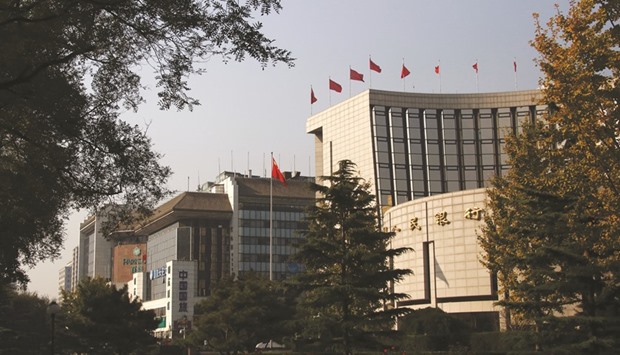China’s central bank reiterated that it will aim for stability in the yuan as it seeks to promote exchange-rate reform and maintain prudent monetary policy.
Policy makers also said they would “earnestly strengthen and improve risk management” to ensure financial stability and prevent market risks, the People’s Bank of China (PBoC) said in a statement after its routine quarterly monetary policy committee meeting. Monetary officials said they will keep moderate liquidity in the financial system, according to the panel’s fourth-quarter statement.
“It’s a reiteration of the PBoC’s stance that, given the weakness of the economy, it will keep policy accommodative,” said Larry Hu, head of China economics at Macquarie Securities in Hong Kong. “It makes sense because in the past two months we haven’t seen a significant change in the economic data so it’s OK to keep some continuity of policy.”
The monetary policy committee, an advisory body led by PBoC Governor Zhou Xiaochuan, also reiterated that the central bank will use monetary policy tools flexibly, language that was also echoed this month by the nation’s top leaders.
Monetary policy must be more “flexible” as leaders create “appropriate monetary conditions for structural reforms,” according to statements released at the end of the government’s Central Economic Work
Conference last week.
The central bank last cut interest rates in late October, reducing the benchmark one-year lending rate to 4.35% from 4.6%, while also reducing reserve requirements for all banks, to keep the government on track to meet its 2015 growth target of about 7% for the world’s second-largest economy.
After a surprise devaluation of the yuan in August, the PBoC said this month it will use a basket of currencies to value the currency instead of linking it directly to the US dollar.
Gross domestic product growth will slow from 6.9% this year to 6.5% next year, according to the median of economist estimates in a Bloomberg survey.
Meanwhile China’s banking regulator laid out planned restrictions on thousands of online peer-to-peer lenders, pledging to “cleanse the market” as failed platforms and suspected frauds highlight risks within a booming industry.
Online platforms shouldn’t take deposits from the public, pool investors’ money, or guarantee returns, the China Banking Regulatory Commission said yesterday, publishing a draft rule that will be its first for the industry.
The thrust of the CBRC’s approach is that the platforms are intermediaries - matchmakers between borrowers and lenders - that shouldn’t themselves raise or lend money. It rules out P2P sites distributing wealth-management products, a tactic that some hoped would diversify their revenue sources.
“The rule is quite strict,” Shanghai-based Maizi Financial Services, which operates a P2P site and other investment platforms, said in a statement. “The industry’s hope of upgrading itself with wealth management products and adopting a diversified business model is completely dashed.”
The banking regulator issued its plan at the same time as the central bank put out a rule to tighten oversight of online- payment firms.
The looming clampdown - the regulator asked for feedback by January 27 - comes as the police probe Ezubo, an online site that raisedbns of dollars from investors according to Yingcan Group, a company which provides industry data. It also follows a stock boom and bust that was fuelled by leverage, including some channelled through online lenders.
China had 2,612 online lending platforms operating normally as of November, while another 1,000 were “problematic,” the CBRC said.
Firms such as Tiger Global Management, Standard Chartered and Sequoia Capital are among those to invest in the industry, which China initially allowed to develop without regulation.
Under the planned rule, P2P platforms will need to register with local financial regulators and cannot help borrowers who want to raise money to invest in the stock market.
“Many online lenders have strayed from the role of information intermediary,” the CBRC said in a separate statement, adding that it wanted to protect consumers and “cleanse the market.”
In September, the Supreme People’s Procuratorate said an explosion in financial crimes included criminals exploiting the anonymity afforded by P2P lending platforms, the official Xinhua News Agency reported.
In the draft rule, online platforms need to publicly disclose information on their borrowers, the projects that money is going into, and associated risks - along with information on the total amount of loans brokered and the proportion outstanding to the largest borrower.

The People’s Bank of China headquarters (right) is seen in the financial district of Beijing. The monetary policy committee, an advisory body led by the PBoC Governor Zhou Xiaochuan, reiterated that the central bank will use monetary policy tools flexibly.
